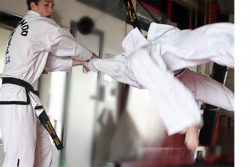Difference between revisions of "Knowledge of Taekwondo for 3rd KUP"
m (Adapted semantic variable) |
m (Adapted semantic variable) |
||
| Line 1: | Line 1: | ||
| − | |||
<noinclude> | <noinclude> | ||
'''<span style="color:white; background:white">[[Theory::Knowledge|Knowledge /]]</span>''' | '''<span style="color:white; background:white">[[Theory::Knowledge|Knowledge /]]</span>''' | ||
| Line 5: | Line 4: | ||
'''<span style="color:white; background:white">[[Subject::{{PAGENAME}}]]</span>''' | '''<span style="color:white; background:white">[[Subject::{{PAGENAME}}]]</span>''' | ||
'''<span style="color:white; background:white">[[Level::K3|Exam 3rd Kup]]</span>''' | '''<span style="color:white; background:white">[[Level::K3|Exam 3rd Kup]]</span>''' | ||
| + | '''<span style="color:white; background:white">[[Document::DataSource|Document containing source information|]]</span>''' | ||
</noinclude><br> | </noinclude><br> | ||
Revision as of 14:43, 7 February 2020
Knowledge /
Main Menu
Knowledge of Taekwondo for 3rd KUP
Exam 3rd Kup
Document containing source information
Matsugi
For the exam, the student must perform 10 SAMBO MATSUGI programs. In addition, the student's needs 10 IBO MATSUGI (two-step) demonstration. During the exam, the student will do also 8-ILBO MATSUGI's (one step sparing).
Should you need a reminder on how to proceed, see this link.
Hosinsul
Foreword
In HOSINSUL (self-defense), there is usually physical contact between the attacker to defender.
In defense against weapons there is usually physical contact of the defender against the attacker.
We share hosinsul into two parts:
- Physical contact attacker
- Forward with weapons
Therefore ITF Taekwondo is a modern sport considering all possible defense techniques. For defense For example, long distance (legs), medium range (arms, elbow, knee) or close distance (throwing, extrication,vital points).
Note: It is always possible that one is faced with a very strong opponent. Here are two solutions:
- Use your speed and rotational movement.
- Hit the opponent in a painful place.
Physical contact attacker
The opponent holds.
Three possibilities:
- Offensive movement: against opponent attacks with stroke or stamp on a vital place or vulnerable body spot.
- Breaking movement: on the attacking limb.
- Liberation movement: by twisting motion followed by counterattack.
Attack Situations
- standing
- kneeling
- lying
- sudden attack of opponent
Back to top of page - Back to Welcome Page
Throwing and falling techniques
Fall is an art, take into account these rules :
- Relax Body
- Try to fall on you side, not front on the back.
- Safely absorb the shock with the palm of the hand on the ground.
- in to chest withdraw to avoid hitting head.
- Legs high.
Just throwing opponents to the ground when you are not really want to hurt him.
Ground Principle: make opponent off balance. Possibilities:
- Standing
- Kneeling
- Lying
Attacker with weapons
You will be attacked with a weapon (s). Dodging is the most appropriate, but you're not far enough (counterattack possible weapon or grab).
Try the opponent to make an additional "step". To be so close (or to weapon accordingly) possible to assist the counterattack finished.
Pihagi (= evade, avoid) is important. Left or right, but not back in line. Block against the arm or hand, but not against the weapon.
